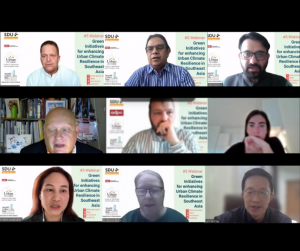
Asian countries are experiencing multiple drivers of urban risk which are rapidly accelerating. Risk levels are growing through a complex nexus of climate change, demographic changes, effects of socio-economic development forces, increased environmental degradation, urban poverty/inequality/ marginalization, corruption, conflict and through the interconnectedness with other forces. In the context of deltaic and coastal cities in Asian countries, these drivers and forces of urban risks are manifested through an unprecedented trend of climate extremes, disasters and emergencies. The trends and patterns of natural hazards particularly due to climate change results in more severe, more intense, more frequent and often quite erratic disasters.
Climate risk information is vital to formulate good urban governance practices in order to manage disasters occurred due to climate extreme events in urban settings. The URCE program team in the month of May 2023, organized a two-day consultative workshop to raise the awareness of the relevant stakeholders on the need for climate risk information for formulating good urban governance practices.
Around twenty officials representing Viet Nam Disaster and Dyke Management Authority (VDDMA), Urban Development Agency (UDA), the Peoples’ Committee of My Tho and Nam Dinh cities and the Provincial Steering Committees (Tien Giang & Nam Dinh province) for Disaster Prevention and Search and Rescue participated in the two day workshop.
Dr. Doan Thi Tuyet Nga, Director of the Department of Technology and International Cooperation, Viet Nam Disaster and Dyke Management Authority (VDDMA), inaugurated the workshop. She emphasized on the activities that are currently being carried out at the national and local levels focusing on building urban resilience to climate extremes in Viet Nam. Disaster risk is higher in urban areas due to the high-density population and the infrastructure. She mentioned that integration and cooperation among multiple sectors is essential to address urban risks in an effective manner.


During the first day of the workshop, the URCE team presented the results of the Hazard, Vulnerability and Risk Assessment done in the two pilot cities of My Tho and Nam Dinh. The technical sessions provided participants with a comprehensive understanding of hazard risk assessment and equipped them with practical skills to identify, analyze, and mitigate risks effectively.
On the second day of the workshop, technical sessions presented the essential elements of climate-resilient urban governance systems, the incorporation of risk information into urban governance functions and a few of the widely used global urban resilience assessment tools. A group discussion stage was organized to identify the present status, gaps and needs associated with the urban governance functions falling under the Disaster Management Cycle (Pre-Disaster, Response, Post-disaster) in the two cities. The URCE program team will now develop the recommendations for addressing the gaps and needs of the two cities.
The interactive nature of these sessions encouraged knowledge sharing, networking, and collaborative problem-solving among the participants, further enhancing the workshop’s overall outcomes.







